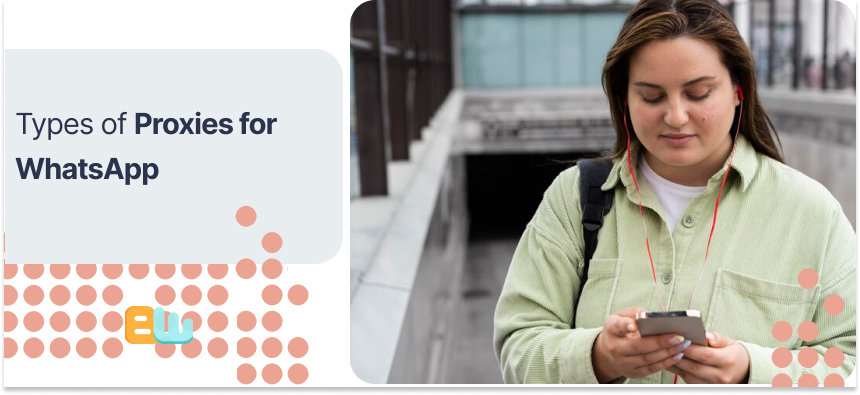
In today’s digital age, where personal information is constantly at risk of being compromised, ensuring secure communication has become a top priority for individuals and businesses. With the increasing prevalence of cyber threats and data breaches, finding effective ways to protect sensitive information shared on various platforms, including social media and messaging apps, is crucial. WhatsApp, one of the most popular messaging apps, offers end-to-end encryption to secure conversations. However, additional steps can be taken to enhance privacy and anonymity while using WhatsApp.
This blog will delve into the basics of WhatsApp proxies, their importance in secure messaging, the different types of proxies available, and how to set up a WhatsApp proxy. By understanding and utilizing free WhatsApp proxies, individuals and businesses can enhance online privacy and safeguard sensitive information from threats.
Understanding the Basics of WhatsApp Proxies

To understand WhatsApp proxies’ role in enhancing privacy, it is essential to grasp how internet connections and online activities work. When users access the internet, their device sends and receives data packets containing information about their online activity. These data packets travel through various networks to reach their destination. However, unauthorized individuals can intercept and access these data packets without protection.
WhatsApp proxies act as intermediaries between the user’s device and the internet. They receive the data packets from the device and forward them to the intended destination, ensuring the user’s IP address remains hidden. By encrypting the internet traffic, WhatsApp proxies provide an extra layer of security, preventing unauthorized access to sensitive information.
What Are WhatsApp Proxies?
WhatsApp proxies are servers that act as intermediaries between a user’s device and the internet when using the WhatsApp messaging app. These proxies receive the data packets from the device and forward them to the intended recipient, ensuring the user’s IP address remains hidden. This adds an extra layer of security and privacy to the communication.
The WhatsApp proxy server acts as a middleman, handling the data packets and ensuring they reach their destination securely. It masks the user’s IP address, making it difficult for third parties to track their online activities. Additionally, WhatsApp proxies encrypt the internet traffic, protecting sensitive information from unauthorized access.
How Do WhatsApp Proxies Work?
WhatsApp proxies work by intercepting and forwarding the data packets sent and received by a user’s device when using the WhatsApp messaging app. When a user sends a message or shares any other information on WhatsApp, the data packets containing that information are first routed through the WhatsApp proxy server.
The WhatsApp proxy server acts as an intermediary, receiving the data packets from the user’s device and encrypting them. It then forwards the encrypted packets to the intended recipient, ensuring the user’s IP address remains hidden. This process adds an extra layer of security and privacy to the communication.
The Importance of Secure Messaging

Secure messaging is of utmost importance in today’s digital age, where personal and sensitive data is constantly at risk of being compromised. With the increasing prevalence of cyber threats and data breaches, protecting personal and sensitive information shared through messaging apps like WhatsApp is crucial.
Secure messaging ensures that personal data, such as contact information, financial details, and private conversations, remains confidential and inaccessible to unauthorized individuals. Encryption plays a vital role in secure messaging by converting the data into an unreadable format that can only be deciphered by the intended recipient. Users can confidently communicate by leveraging secure messaging features, knowing their personal and sensitive information is protected.
Privacy Concerns with Standard Messaging Apps
Standard messaging apps, including WhatsApp, are convenient for communication but can present privacy concerns. These concerns arise from collecting and sharing personal information, such as phone numbers, profile pictures, and contacts.
Standard messaging apps may require users to provide access to their phone contacts, which raises privacy concerns about sharing personal information with third-party apps. Additionally, these apps may use personal data for targeted advertising without the user’s consent.
The Role of Encryption in Protecting Messages
Encryption is critical in protecting messages sent through messaging apps like WhatsApp. It ensures that the content of the messages remains confidential and readable only by the intended recipients.
End-to-end encryption is a robust encryption method used by WhatsApp to secure messages. End-to-end encryption encrypts messages on the sender’s device and can only be decrypted by the recipient’s device. This means that even if an attacker intercepts the messages during transit, they cannot decipher the content.
Encryption also helps maintain data integrity by ensuring the messages are not tampered with during transit. Any changes to the encrypted messages would be detected, alerting the recipient to potential tampering attempts. By leveraging encryption in messaging apps like WhatsApp, users can communicate securely and protect the confidentiality and integrity of their messages and sensitive information.
Why Use a Proxy for WhatsApp?

Using a proxy for WhatsApp offers several benefits, including online privacy, anonymity, and an extra layer of security. A proxy allows users to mask their IP addresses, making it difficult for third parties to track their online activities. This enhances online privacy and protects sensitive information shared through the app.
Additionally, a proxy provides anonymity by acting as an intermediary between the user’s device and the internet. It prevents the user’s IP address from being visible to others, further enhancing privacy and ensuring that online activities remain confidential.
Overcoming Geographical Restrictions
Depending on the user’s location, geographic restrictions can limit access to certain content or services. However, by using a proxy for WhatsApp, users can overcome these restrictions and access content that may be blocked in their region. A proxy allows users to mask their IP addresses, making it appear like they are accessing the internet from a different location. This enables users to bypass geographical restrictions and access content that may be restricted in their region.
Enhancing Privacy and Anonymity
A proxy is an intermediary between the user’s device and the Internet. It allows users to mask their IP addresses and encrypt their internet traffic, which prevents third parties from tracking users’ online activities and accessing their data.
By leveraging a proxy, users can communicate anonymously, ensuring their conversations and personal information remain private and confidential. Whether protecting sensitive data or preventing unwanted tracking, a proxy provides an extra layer of security and anonymity.
Types of Proxies for WhatsApp

Different proxies are available for WhatsApp, including free and paid proxies.
Free proxies are readily available and can be used for personal use. While they provide some level of anonymity and security, they may have limitations, such as slower speeds and a higher risk of being unreliable or blocked.
Paid proxies offer more advanced features and better performance. They are suitable for individuals and businesses that require a higher level of security and reliability. Paid proxies often come with customer support and additional features for a better user experience.
Free vs. Paid Proxies: Pros and Cons
When deciding between free and paid WhatsApp proxies, it is essential to consider the pros and cons of each option.
Free proxies offer the advantage of being readily available and often require no financial investment. However, they may have speed, reliability, and security limitations. Additionally, free proxies may not come with customer support or additional features.
Paid proxies, on the other hand, offer better performance, enhanced online security, and reliable service. They often come with customer support, ensuring users receive assistance when needed. However, paid proxies require a financial investment, and the pricing may vary depending on the provider and the specific features offered.
When deciding between free and paid WhatsApp proxies, users must consider their budget, specific needs, and the level of online security and support required.
Selecting the Right Proxy for Your Needs
When selecting a proxy for WhatsApp, it is essential to consider your specific needs and requirements.
For personal use, users can consider their device, the level of online experience they desire, and their budget. Their choice of proxy will depend on whether they prioritize cost-effectiveness, performance, or additional features.
Users should ensure that the selected proxy is compatible with their device and operating system to ensure seamless integration and optimal performance. Additionally, considering the reputation and reliability of the proxy provider is crucial to providing a secure and reliable service.
Setting Up a WhatsApp Proxy

First, users must find a reliable proxy provider that offers WhatsApp proxy services. Next, they must configure their mobile device’s network settings to connect to the proxy server. This typically involves entering the proxy server’s IP address and port number in the device’s network settings. Once the proxy server is set up and the device is configured, users can launch the WhatsApp app and begin using it securely and anonymously through the proxy server.
Step-by-Step Guide to Configuring Your Proxy
Configuring a proxy for WhatsApp is a straightforward process. Here is a step-by-step guide to help you set up your proxy and ensure secure communication:
- Determine the compatibility: Before setting up a proxy, ensure that your operating system and device support proxy configuration. Most operating systems, including Windows, macOS, iOS, and Android, offer built-in support for proxies.
- Choose a reputable proxy server: Select a reliable and trustworthy one with secure connections. Look for proxies that support encryption and have a good reputation for privacy and security.
- Access proxy settings: Go to your device’s network or Wi-Fi settings and locate the option to configure proxy settings. The exact location may vary depending on your operating system.
- Enter proxy server details: Enter the proxy server address and port number provided by your proxy service. Some proxies may require additional authentication, such as a username and password. Enter these details if needed.
- Save the configuration: After entering the proxy server details, save the configuration and exit the settings menu. Your device should now be configured to use the proxy for all network connections, including WhatsApp.
- Test the connection: Open WhatsApp and send a message to ensure the proxy works correctly. Your proxy configuration is successful if the message is sent and received without issues.
Security Considerations

Regarding online communication and privacy, it is essential to consider the security implications of using free proxies. While proxies can enhance privacy by masking IP addresses and encrypting communication channels, there are potential security risks.
One potential risk is the presence of malicious actors. Free proxies may attract cybercriminals who can use them to intercept sensitive information or launch attacks. To minimize this risk, choosing reputable and reliable proxy services is essential.
Another consideration is the potential for proxy servers to become exit nodes for malicious activities. Some free proxies may route internet traffic through various servers, making it difficult to determine the true origin of the data. This can pose a security risk, as the data may pass through untrusted servers that could compromise its integrity.
Risks Associated with Free Proxies
While free proxies offer enhanced privacy and security, there are also risks associated with using them. It is essential to be aware of these risks and protect your personal information and online activities.
One risk is malicious actors who may exploit free proxies for their gain. If the proxy is not properly secured, these actors can intercept sensitive information, such as login credentials or personal data. Choosing a reputable proxy service and ensuring proper encryption can help mitigate this risk.
Another risk is using free proxies as exit nodes for internet traffic. When data passes through multiple servers, it becomes difficult to trace its origin and ensure its integrity. Untrusted exit nodes could compromise the security of the data being transmitted.
Best Practices for Maintaining Security
Following best practices for optimal protection is essential when using free proxies for enhanced privacy and security. Here are some critical practices to consider:
- Choose reputable proxy providers: Research and select reputable proxy services prioritizing security and privacy. Look for providers that offer encryption, have positive reviews, and have been in the industry for a significant period.
- Secure your personal information: Avoid sharing sensitive personal information through the proxy, such as credit card details or passwords. Keep personal information secure and limit its exposure to minimize the risk of compromise.
- Use strong and unique passwords: Create strong and unique passwords for your accounts to prevent unauthorized access. Avoid using the same password for multiple accounts to minimize the impact of a potential breach.
- Keep devices and software up to date: Regularly update your devices and software to ensure they have the latest security patches. This helps protect against known vulnerabilities and keeps your system secure.
- Be cautious of suspicious links and downloads: Avoid clicking on suspicious links or downloading files from untrusted sources. These can introduce malware or compromise your security.
Conclusion
In conclusion, leveraging free WhatsApp proxies can significantly enhance your privacy and security while communicating. Understanding the basics of how WhatsApp proxies work and the importance of secure messaging is crucial in today’s digital landscape. You can communicate with peace of mind by overcoming geographical restrictions and ensuring privacy and anonymity. Remember to select the suitable proxy for your needs, set it up following a step-by-step guide, and consider the security risks associated with free proxies. Stay informed on the latest proxy services to maintain your privacy effectively. Safeguard your communication with the right tools and practices for a secure messaging experience.
